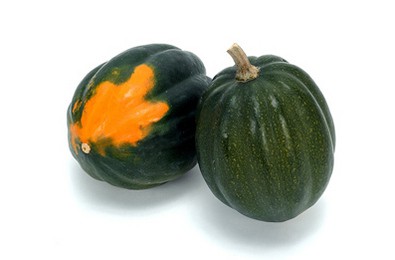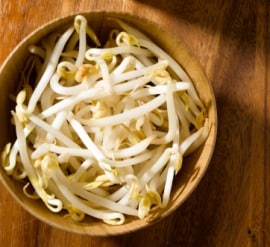Leeks are root vegetables that look quite similar to onions, to which they are related. Their flavor is onion-like but much milder. People who avoid leeks because they don’t like onions should try them — their flavor is mellow and not overpowering, and many onion-haters love leeks. Leeks don’t form much of a bulb on the end of the root as onions do. Instead, they remain cylindrical, with perhaps a slight bulge at the end. The part of the leek that is under ground remains tender and white, while the part exposed to the sunlight becomes tough and fibrous and not very good eating. To maximize the edible part of the leek, farmers mound the dirt up around the sprouting plant; this keeps more of it underground and white, but also means that dirt often gets between the layers, so leeks need careful cleaning before cooking.
Leeks are most commonly used in soup, most notably in vichyssoise, a lovely soup composed of potatoes and leeks and served cold — excellent for summer day lunching. If you have a favorite potato soup recipe, try adding some sliced leeks next time you prepare it — leeks, potatoes and carrots in a chicken broth is about the best soup there is. Leeks are also edible raw, and can impart a great crunchy flavor to salads or when eaten with a dip. Cut leeks in half lengthwise and rinse thoroughly to remove and dirt or grit, then add to a platter of crudites.
Leeks are a great source of fiber in your diet, and may actually help lowercholesterol. They’re also packed with important vitamins and minerals, includingpotassium, so if you are trying to increase your intake of potassium, add a few leeks to your week.
Health Benefits of Leeks
- A particular combination of nutrients in leeks is very helpful in steadying elevated blood sugar level. These include vitamin C, vitamin B6, folate, iron and manganese. These nutrients do not slow the absorption of sugars from the intestinal tract. They lower the sugar levels merely by ensuring that the sugars are properly metabolized in the body.
- A regular intake of leeks has been associated with the raise in the HDL (High Density Lipoprotein or ‘good’ cholesterol) levels and the corresponding decrease in the LDL or Low Cholesterol Lipoprotein levels. Maintenance of this balance in the body is very essential as it helps in the prevention of either the onset or the progression of plaques in the blood vessels in the body. It is this plaque formation that leads to the occurrence of atherosclerosis and diabetic heart disease in humans. Progression of these plaques can even result in a heart attack or stroke.
- Intake of Allium vegetables like leeks also cause decrease in high blood pressure levels, another major factor for the occurrence of stroke and heart attack.
- Leeks are also known to promote optimal health of humans. Consumption of the vegetable has been shown to considerably decrease the risk of colon and prostate cancer.
- Studies have also shown that the vegetable is beneficial in the prevention of ovarian cancer in females.
- A good source of dietary fiber, leeks energizes the human body to perform many types of biological functions like digestion and metabolism.
- Leeks are especially essential for pregnant women as they contain considerable amount of folate (a type of vitamin). Due to this, a number of birth defects are prevented, particularly the ones that are related with the spine and brain of the baby like spina bifida and encephalitis.
- The use of calcium in the maintenance of a healthy skeletal system has been known since a long time. Leeks, a good source of calcium helps in achieving this effect. Calcium is also used for the proper clotting of blood in the human body.
- In addition to the health benefits mentioned above, leeks also act as an antiseptic and help the body fight against infection and contamination.

